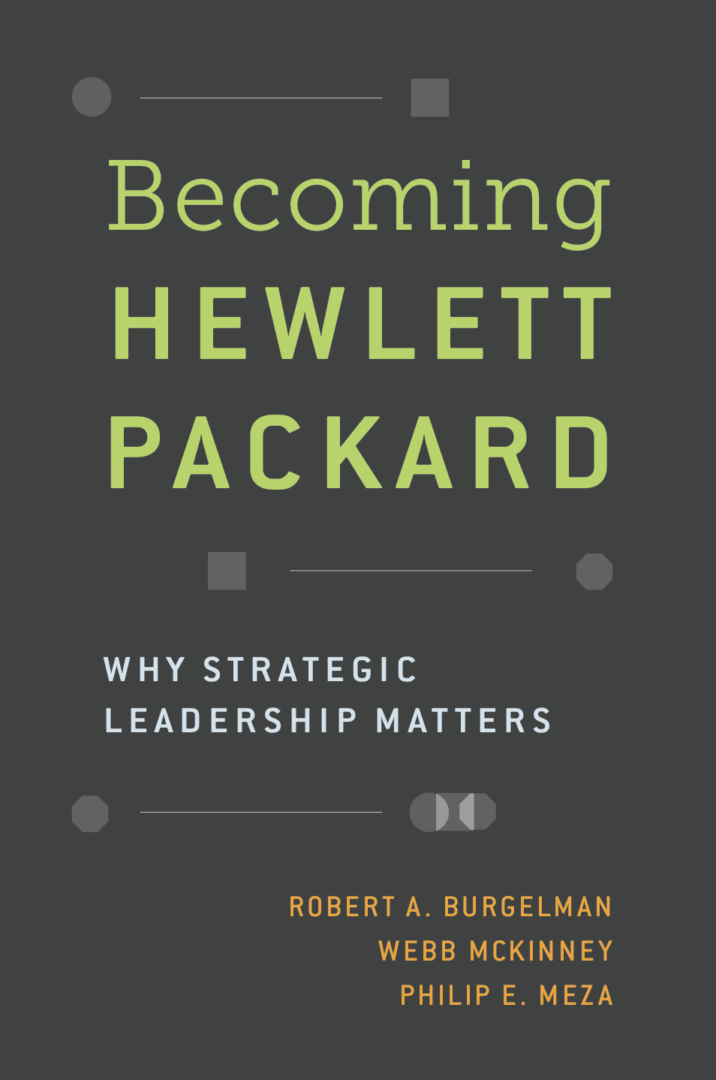After retiring in 2003 from technology giant Hewlett-Packard after 34 years, Harry W. (Webb) McKinney (B.S. EE ’68, M.S. EE ’69) took a year off to think about his next steps.
The former corporate executive’s self-reflective hiatus led him to Professor Robert Burgelman at Stanford’s Graduate School of Business. Burgelman had worked on a case study of HP under then-CEO Carly Fiorina’s leadership, and was interested in teaming up with Webb for a paper about the much-scrutinized 2001 HP-Compaq merger.
Their paper was published in 2006. Two years later, Burgelman contacted McKinney again for a study about HP’s networking business, which McKinney had also overseen.
Fast forward to 2010, when Burgelman and Webb, along with frequent collaborator Philip Meza, teamed to write a definitive book about HP. Oxford University Press will publish “Becoming Hewlett Packard: Why Strategic Leadership Matters” in December.
“While other books had been written about HP, none had been focused solely in this area, and I thought it would yield new and important insights,” McKinney said.
What they thought would take three years to write eventually took six. They conducted more than 70 interviews with the company’s CEOs, board members and other executives. Mark Hurd was the CEO when they started writing the book, eventually replaced by Léo Apotheker, then Meg Whitman.
“Webb was instrumental in convincing many of his senior executive acquaintances at HP to participate in the interviewing process, and provided important data and inputs for the narrative chapters that would have been impossible to get otherwise,” Burgelman said.
From USC to HP
Originally from Ontario, California, McKinney graduated with his electrical engineering degrees in the late 1960s. Being a part of the Trojan Family — specifically, what is now USC Viterbi — shaped his future for what would become his life’s work at Hewlett-Packard.
“What I learned at USC was how to approach a wide range of complex problems,” he said. “USC built my confidence in being able to apply myself in unknown situations.”
Indeed, his talents would be needed as one of America’s foremost technology companies continued to experience major transitions — and McKinney was there for almost all of them.
I joined HP after graduation because the culture felt like a good fit.
What a fit it was. McKinney started in marketing before transferring into R&D. In the early 1980s, he applied for the position of manager within the company’s new desktop PC business.
“By then, HP was way behind Apple, IBM and many others,” he said. “This was a fast and chaotic environment, and it took me a year to really get on top of it.” More senior roles at HP followed, including running the transformational HP Pavilion line of home PCs.
“The Pavilion gained the No. 1 market-share position in the world,” he said. “I will always view this as a career highlight.”
McKinney’s part in the success of Pavilion was recognized, and in 1999, he took over HP’s entire PC business.
“Dell was creating a huge problem for us in our commercial PC business at the time. We were making good progress, but before I could finish this work my phone rang,” McKinney said.
It was Fiorina, who had taken over as HP’s CEO in 1999. With a goal of completely reorganizing the company, Fiorina asked McKinney to run the customer-facing B2B organization. This included sales, marketing and supply chains for all of HP’s business with commercial customers, which represented 60 percent of the company’s revenue.
Things changed again in August 2001, when HP agreed to merge with Compaq. Fiorina asked McKinney to lead the integration of the two companies. As the tech market slumped after 9/11, company goals changed, and McKinney eventually retired in 2003.
“Webb was always given the toughest jobs, none more difficult than leading the integration of HP and Compaq,” Fiorina said. “He got those tough jobs because he delivered. He is trustworthy, honest about the good, the bad and the ugly, calm in a tense situation, and focuses not just on results but on the well-being of his people.”
Paying it forward
Throughout his time at HP and since his retirement, giving back has played a large role in McKinney’s life.
During his final year at the company, McKinney joined the American Leadership Forum, which brings together leaders in business, the nonprofit sector, the public sector, labor and religion. When he retired, his ALF experience, combined with the strong values instilled at HP, convinced him that he wanted to spend much of his time helping the nonprofit sector.
During the past 13 years, McKinney has served on the boards of five nonprofits, including Encore.org, which helps for-profit employees transition to the nonprofit sector, and ALearn, which works with elementary and middle school students and is focused on math, science and underserved communities. He has also taught and done pro bono consulting work.
For McKinney, philanthropy is definitely a family activity. His wife, Chris (B.A. ’68, M.Ed. ’69), is heavily involved with Music for Minors, which teaches music education to elementary school students in the Bay Area. More recently, she has joined the board of the Center for Excellence in Nonprofits, which helps train nonprofit executives and boards in best practices.
The McKinneys have established a donor-advised fund through which they manage financial contributions to many organizations, including USC. Through their Trojan Legacy Circle commitment and annual philanthropic support, they have created the McKinney Scholarship to help make a USC education available to aspiring educators and engineers from underserved communities.
They also involve their two daughters in philanthropy by teaching them to give to their own preferred chosen causes and organizations.
McKinney, who is currently working on a book about a Silicon Valley startup, said his view of philanthropy mirrors his view of business and life.
“Being a good leader means being a good communicator,” he said. “The key is to speak well, and to listen even better.”





